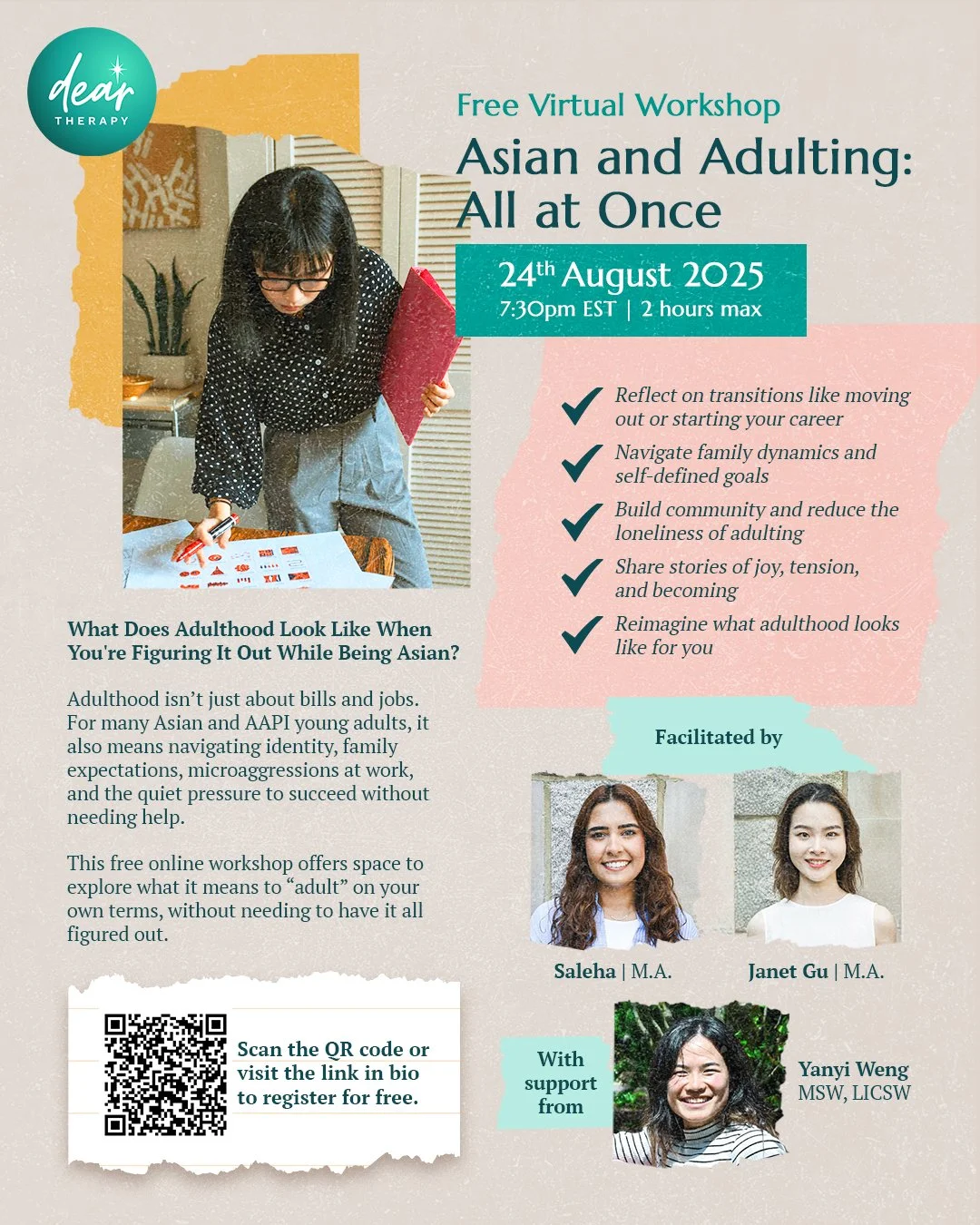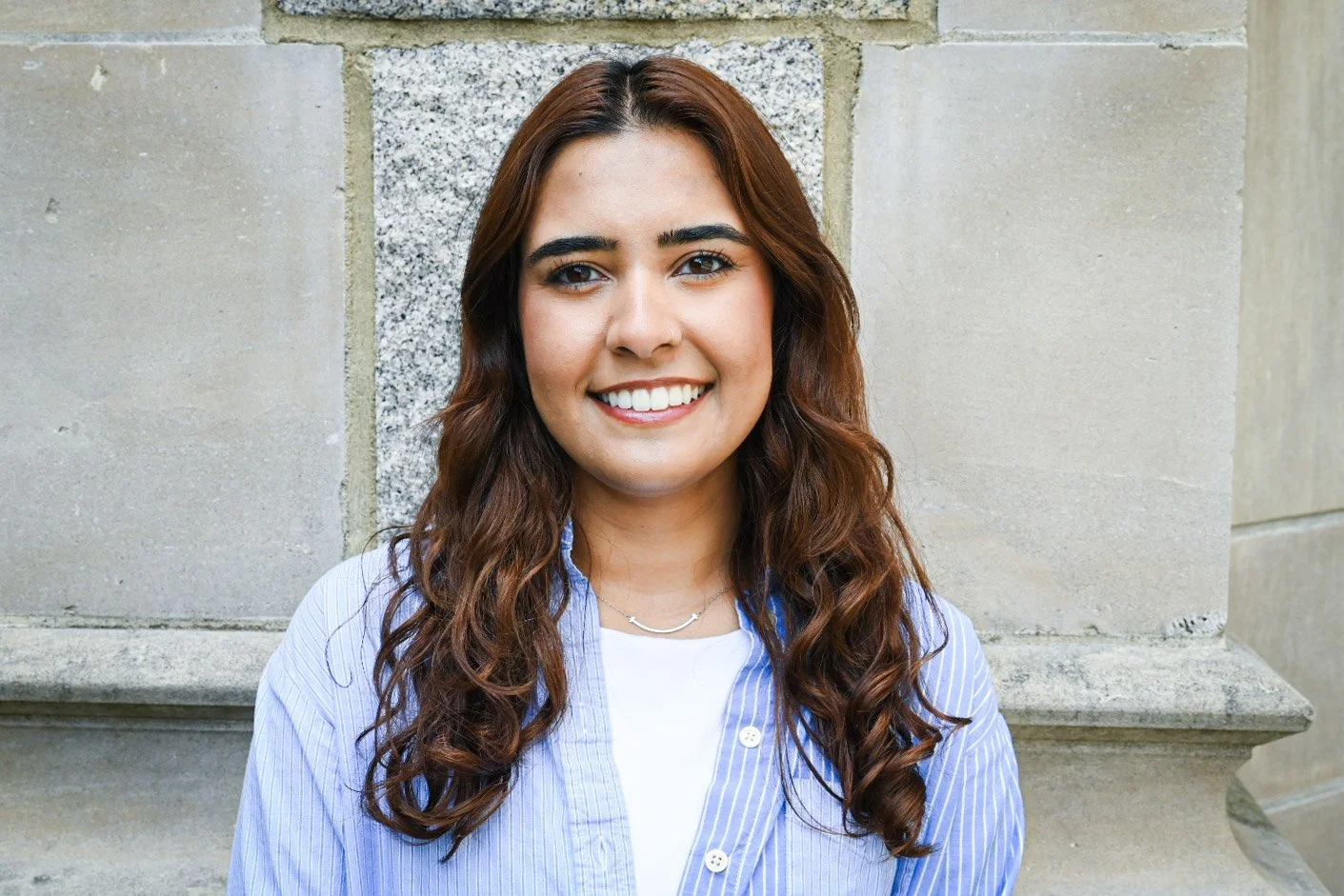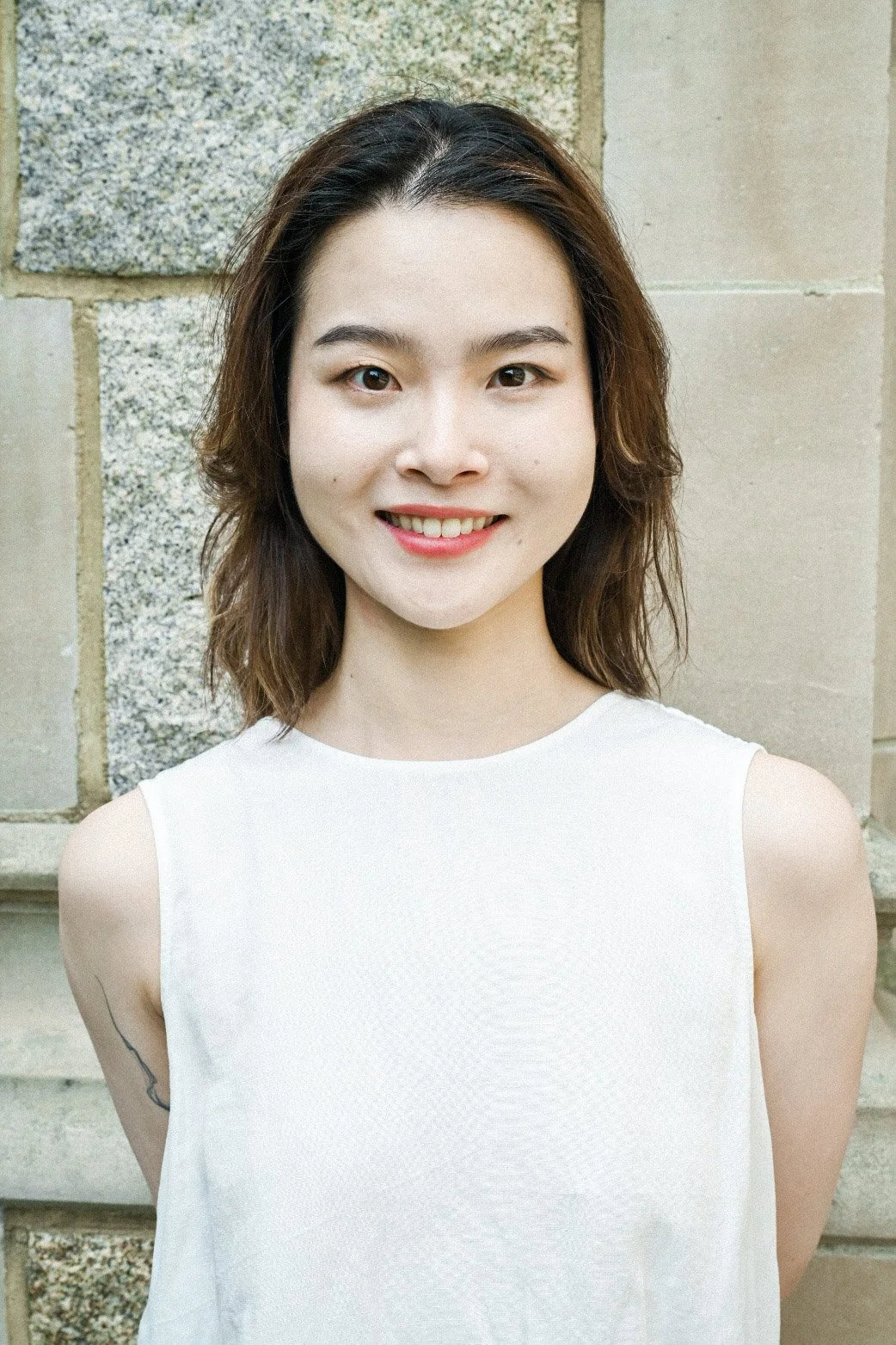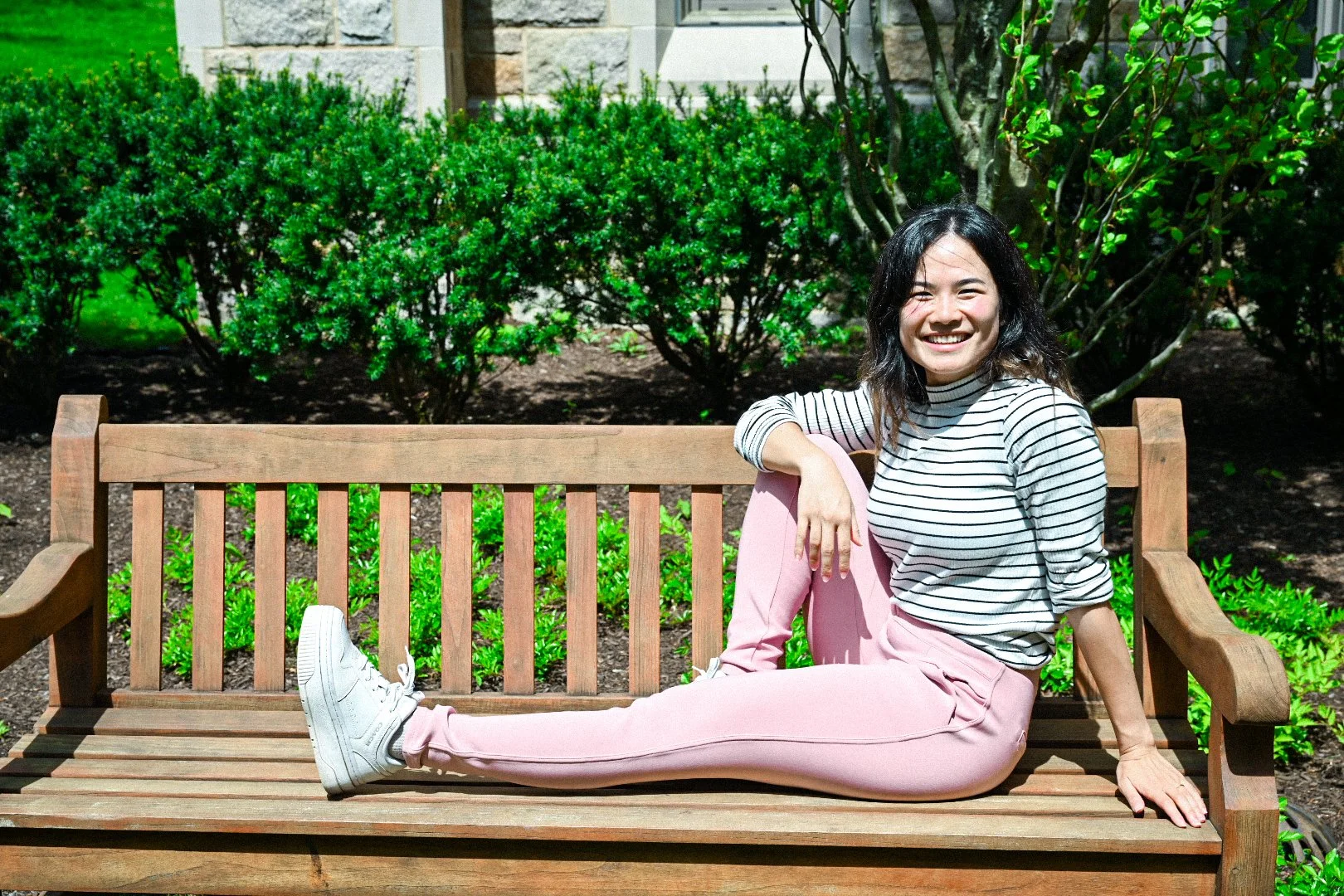
Free Online Asian and Adulting Workshop
24th August 2025
7:30 pm EST
Asianning and Adulting, All at Once
What does it really mean to “adult” when you’re navigating life as an Asian or AAPI person in a world that often flattens our experiences?
This workshop explores the transitions, contradictions, and quiet joy of becoming, all while moving through cultural expectations, racialized realities, and intergenerational narratives. Together, we’ll reflect on how we carry, question, and reimagine what adulthood looks like for us, in community.
Why Explore Adulting as Asian or AAPI?
“Adulting” isn’t only about managing responsibilities. It can also be about navigating identity, expectations, and relationships in a world that often overlooks cultural nuance. For Asian and AAPI young professionals, the path to adulthood can feel especially complex.
This workshop offers a supportive space to:
Reflect on transitions like starting a career, moving out, or managing adult relationships
Unpack the push and pull between self-defined paths and intergenerational values
Share strategies for navigating microaggressions, stereotype pressure, and isolation at work
Build peer support that makes adulting feel less lonely
Clarify what adulthood means to you, not just what’s expected of you
Research has long recognized that the late teens to late twenties is a unique and often under-supported life stage. Jeffrey Arnett’s (2007) theory of emerging adulthood describes this time as one of instability, identity exploration, and self-reflection. Many young people are no longer adolescents but do not yet feel fully adult. They are still shaping their values, goals, and sense of belonging.
For Asian and AAPI individuals, this process often includes additional layers. Huang (2021) found that second-generation Asian American professionals frequently experience workplace microaggressions, feel pressure to minimize their racial identity, and face disconnects between academic achievement and professional inclusion. These challenges can make adulting feel more fragmented and less supported.
This workshop creates space to explore adulting through honest conversation, shared stories, and cultural context. Together, we’ll reflect, connect, and build language for navigating this complex phase of life with more clarity and self-understanding.
Who Is This Workshop For?
This space is designed for:
Asian and Asian American young adults navigating life after college or entering early career paths
Anyone feeling uncertain about what adulting means when you're balancing cultural expectations with personal goals
Individuals exploring identity, independence, or belonging in the context of emerging adulthood
Those who want a safe space to reflect on professional relationships, family dynamics, and personal growth
Young professionals looking for community-based, culturally responsive mental health support tailored to AAPI experiences
If you're in a life transition and feel like you're “figuring it out” while also managing the pressures of being both Asian and adult, this workshop was created for you.
We welcome all who are navigating this complex stage and will meet you where you are with care, community, and curiosity.
Facilitators
Saleha Mian, M.A. & Doctoral candidate/Researcher
Associate Psychotherapist
Saleha Mian is an associate psychotherapist who supports teens, young adults, and individuals navigating life transitions, identity questions, grief, and the layered effects of trauma. Her approach is grounded in cultural responsiveness, humor, and a belief that healing can hold both seriousness and softness.
As the daughter of Pakistani immigrants, Saleha brings deep awareness of how cultural expectations, intergenerational dynamics, and unspoken emotional norms shape the way we move through the world. She draws from trauma-informed, strength-based, narrative, CBT, and cultural relational frameworks to support clients in unpacking these complexities with care and curiosity.
Saleha creates a space where silence, laughter, and contradiction can coexist. Whether you’re processing what hurts or reclaiming parts of yourself that have long been quieted, she walks alongside you, not to fix or advise, but to hold space for your process and remind you that you don’t have to go it alone.
Janet Gu, M.A. & Doctoral candidate/Researcher
Associate Psychotherapist
Janet is a Chinese immigrant therapist who brings a deep understanding of cultural identity, marginalization, and emotional resilience to her clinical work. With a background in both research and direct service, she is passionate about holding space for stories that have long been silenced, especially among clients navigating complex cultural expectations, life transitions, and past trauma.
Her therapeutic style is collaborative, holistic, and rooted in client empowerment. Drawing from cognitive behavioral therapy, motivational interviewing, and narrative therapy, Janet supports clients in reconnecting with their strengths and shifting internalized “shoulds” into self-defined wants.
She is especially attuned to the mental health needs of BIPOC, immigrant, and LGBTQIA+ communities, and works with care and curiosity to honor each client’s pace and voice.
Janet believes healing begins when we feel safe enough to be honest and supported enough to imagine new ways of living.
Supervisor
Yanyi Weng, MSW, LICSW
Founder, Clinical Director, and Psychotherapist
Workshop Details
Workshop Length: 2 hours max
Date: 24 August 2025
Time: 7:30 pm EST
Check-in Time for Tech: We’ll share this in your calendar invite before the session.
Participant Info
Target Audience: Asian and Asian American young adults navigating early career paths, post-graduation shifts, and the complexities of adulthood during times of transition.
-
Set the tone for the session and introduce the purpose and flow of the workshop.
-
Engage in light, low-pressure activities designed to build comfort and connection.
-
Therapist introduces tools and models open, respectful communication to create a safe environment.
-
Participants reflect on their own experiences, challenges, and strengths in a guided discussion.
-
Learn about helpful tools, readings, and therapy options that support continued growth.
-
Debrief together, ask questions, and explore how to stay connected or join ongoing group therapy.







